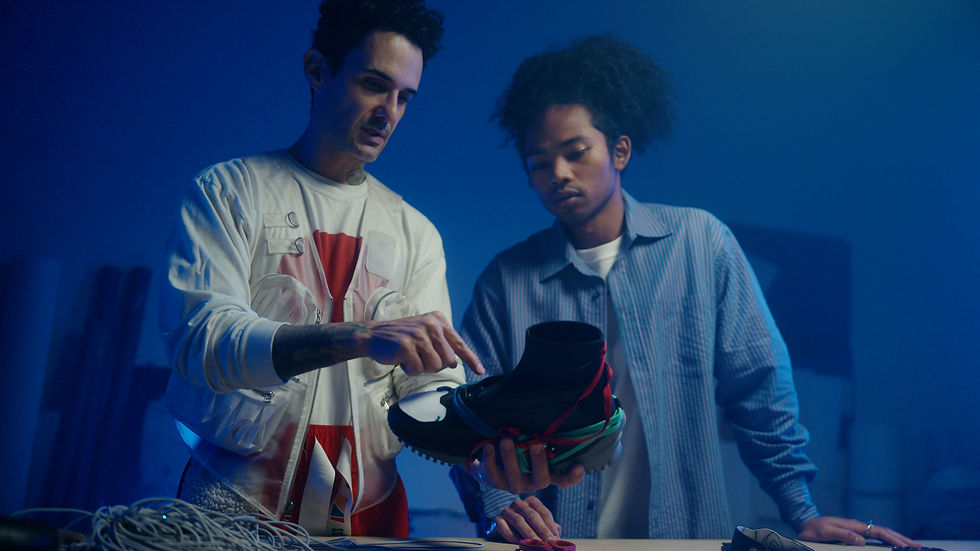Seattle’s Guillermo Bravo Launches New Sneaker
- By Rachel Gallaher
- Mar 21, 2022
- 3 min read
Updated: Mar 23, 2022
The brand is currently raising money through a Kickstarter campaign for its customizable FSI-1.
By Rachel Gallaher

The Future Standard Issue-1 sneaker is the latest footwear design from Guillermo Bravo. Image by Brandon Scott Herrell.
Luis Velez—the designer behind Settle-based apparel brand Guillermo Bravo—has been interested in fashion since childhood. A Colombian immigrant who moved to the United States with his family at the age of 8, Velez initially had trouble finding his place. Not knowing the language made communicating and making friends difficult, so Velez started using his clothes and shoes as a way to express himself.
"I learned the basics of how to dress well from my older sister, then combed the thrift stores of Miami to find some cool pieces on a budget,” the designer says. "I was getting in a lot of trouble when I was young and ended up grounded for a whole summer. The only thing I could do was play basketball, and after that summer, I was hooked. It was all I ever wanted to do. It taught me a lot about life. Grit, discipline, and a love for sneakers.”
All three of these attributes remained pivotal to Velez’s life, and he’s channeled them into a successful career in fashion. In 2018 he launched Guillermo Bravo (his newest collection of apparel, Architect Mom crosses Northwest sensibility with high-fashion silhouettes), and two years later he opened CORRE, a footwear shop in Seattle’s Madrona neighborhood.

Guillermo Bravo founder Luis Velez (left) with Shu Jones, the brand's head of footwear design. Image by Jack Magraw.
In March, Velez introduced his brand’s latest footwear offering, the Future Standard Issue-1, with an accompanying Kickstarter. Designed with customization in mind, the sneakers have innovative interchangeable shrouds that can be unzipped and replaced with new shrouds of diverse materials and colors whenever the wearer feels.
“The truly intriguing component of the sneaker is the idea of customizability and reinvention,” Velez says. “Take people like Nicole Mclaughlin and Studio Hagel for instance. Just doing weird shit. What I see is this movement of creatives customizing everything they wear, everything they create. We want to be able to connect to the people seeking outlandish design by creating something ever customizable. The FSI-1 is more than just a shoe, but an ever-evolving conversation.”
Velez founded Guillermo Bravo as a passion project, but it was the COVID-19 pandemic—and the resulting swathe of time to slow down, think, and create—that set into motion his decision to pursue fashion design full-time. Guillermo Bravo had already released two limited-run sneaker designs when Velez started thinking about a third.

The FSI-1 sneaker is customizable through a series of interchangeable shrouds that allow the wearer to change the color, pattern, and texture of the front of the shoe. Image by Brandon Scott Herrell.
“We were interested in continuing to explore some of the core ideas within our brand,” he says, “[including] innovation, sustainability, and creativity. Could we take a recently released sole unit from Vibram, design an upper that is customizable and fits our DNA? Could we develop a sneaker that would create dialogue and collaboration amongst any creative? We wanted to produce one sneaker that could be seen as four sneakers through the component of a shroud. The possibility of creating something that would make other designers say, ‘Damn, why didn't I think of that?!’”
Like all of Guillermo Bravo’s offerings, the FSI-1 is genderless. The shoes are manufactured in Italy using vegetable-dyed leather and neoprene booties for comfort. Sustainability is also important.
“The FSI-1 allows people to consume less but still express themselves and be the opposing force to the elements in their environment,” Velez says. “We have to react to the climate changes around us by analyzing the ways we produce. With all of our pieces, we do our best to be responsible stewards of earth’s fleeting resources, creating pieces that are as sustainable as possible. With our Kickstarter campaign, our team and I hope to tell the story of how fashion and the human experience as a whole are changing because we aren’t taking care of the earth in the ways we should.”











